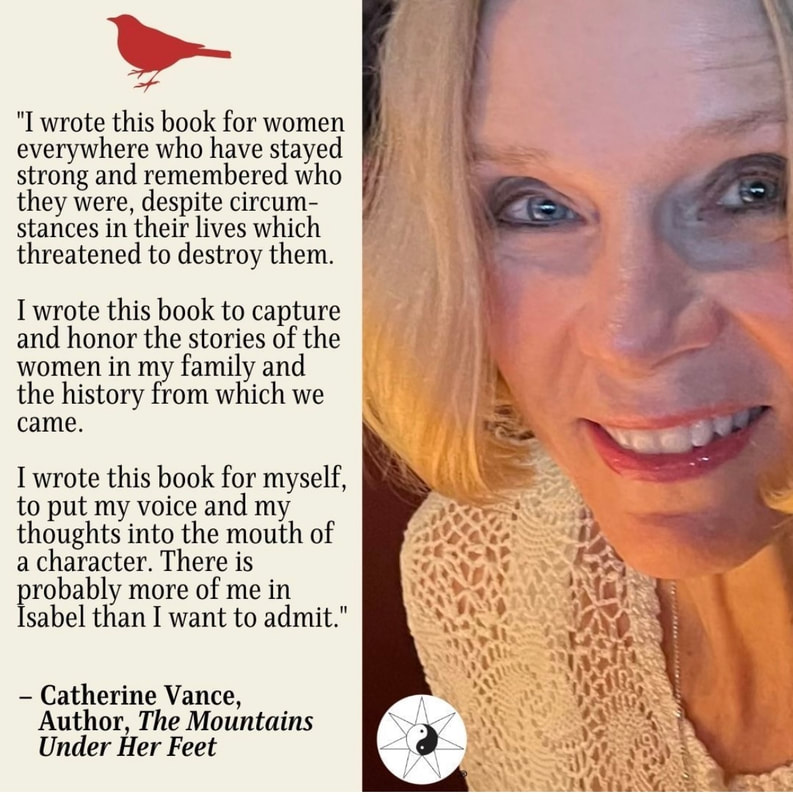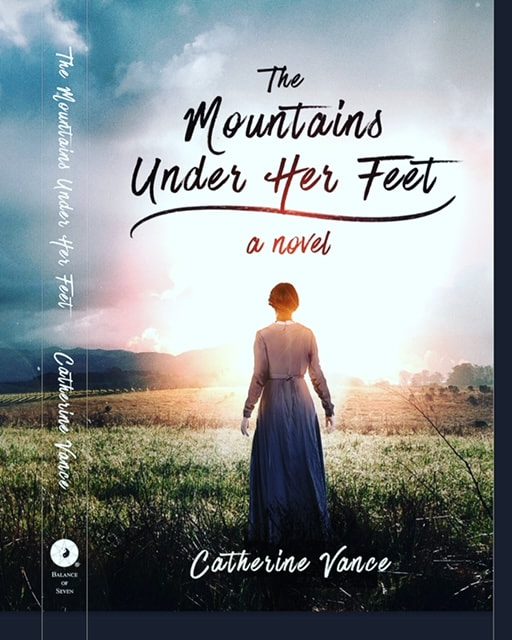|
Catherine Vance is one of the faculty members at Writespace. She has taught English classes at Texas A&M, the University of Texas at San Antonio, and Methodist College. She has also written The Orchard Camp and Other Stories, a short story collection book, and is a recipient of the Dobie-Paisano Award from the Texas Institute of Letters. At Writespace, Catherine teaches a wide range of courses and is passionate about teaching classes on social justice. Currently, she’s an interfaith chaplain at MD Anderson Cancer Center. Her novel The Mountains Under Her Feet will be released in May 2023. Click here to visit her website and pre-order your copy. You’re working on a novel called The Mountains Under Her Feet set to be released in 2023. What’s the novel about? I grew up in East Tennessee where the story takes place. The story is set in Oak Ridge, Tennessee, where atomic bombs were built. The story is about a woman who lives there before the Manhattan Project and WWII. It follows her life as the world changes and goes from the rural, pastoral setting to the new atomic age. Her life blows up against this background. The novel is told like a memoir. What’s the inspiration behind it? I drew inspiration from my family’s experiences. I fictionalized their experiences and put them in the book. There’s a lot of me in my character and book, such as searching for a place where everything can be finally good and peaceful. I dedicate the book to the strong women in my family. Do you have a writing ritual you follow? Sometimes I get so busy with my “day job” that I just write poetry or journal entries. When I’m in writing mode, I write for 3-4 hours in my study. Have you found it easy to write your novel or not? What challenges have you encountered during the writing process? When I first started writing it, I had a lot of trouble with it because I was in a place where I asked myself why I was doing it and if I was being self-indulgent, and I didn’t have the confidence to do it and believe that something would come up out of it. I had to talk myself into it. It wasn’t until I was a quarter into the book that I said to myself that I didn’t care if someone wanted it or not. I needed to write the book and liked writing the book. After that, I gained momentum. In terms of resources, what kind of resources are you using for the book? The story is set in Tennessee from 1911 to the 1940s, so it takes that period when the world changed as WWII happened and the new nuclear age came about. I had to research WWII, plus other things that were happening during that part of the world, such as the Spanish flu, which I thought would resonate with people because of COVID. I researched how people, particularly in Tennessee, lived through the flu. I also researched how people dealt with the government taking their land under false pretenses to build bombs. My publisher, Balance of Seven Press, provided a historian to fact-check me, which I appreciated. Did you find anything interesting or surprising during your research? It was surprising to me to learn how easily people agreed to have everything just taken away from them and what became of them. I also enjoyed learning about the old farming ways and how people lived before the modern world intervened. When can we expect to be able to buy the novel? What’s the timeline looking like right now? It’s coming out in May 2023, and I just had the chance to see the potential book covers, which has been really exciting. Aside from being a writer, you’re an interfaith minister. How did this come about?
I taught English at various colleges and universities, but I have always been interested in social justice. When I moved back to Texas in 2018, I started working with my church doing social justice work and also preaching. I had been through trauma myself. I had gone through a very painful divorce and was looking for a way to be present for people to deal with their life crises. I found out about some programs in hospitals for chaplaincy. I applied for one and this became an extension of the work I was doing through my congregation. Now I’m doing my seminary to become a minister and a chaplain. How has this role influenced your writing and your social work in Houston? I have always been interested in various religious points of view, how people think, and what brings them meaning and comfort. I hope to put these things into my main character in The Mountains Under Her Feet. It has influenced how I portray my characters. Also, I honor different kinds of journeys where people find ways to connect and can be part of something greater than themselves. What social justice areas are you passionate about, and how are they reflected in your writing? I have always been passionate about people connecting and dialoguing across racial and faith boundaries. I'm very passionate about women's rights, reproductive justice, immigration, and LGBTQ+ rights. You’re also an instructor. Why do you teach? I used to teach freshman English at the university level. At the time, I felt like people didn’t like the class much because they had to take it and didn’t get inspired by it. I was very happy when I came to Writespace because I got the opportunity to teach things that I developed and felt were important. You teach at Writespace. How did you join the organization? When I moved back to Houston, I was looking for work. Unfortunately, many opportunities dried up due to COVID. I took a memoir class at Writespace because I wanted to work on a piece of my own. I was first a student and then became a teacher. What are you particularly geeked to teach about? I have loved everything that I have taught! Jamie asked me to teach lyric essay writing. Even though I didn’t know much about it, I did it, and now I love it. I developed a “Writing Through Your Dreams” class. Every dream that I have had has been like a narrative, and I have always been passionate about analyzing and understanding them. I’m geeked about using dreams in writing. I like the students to write about their dreams and work them into larger stories. The social justice writing classes have been the most meaningful because people share the things they have been through. All of these things are heart wrenching and important. The stories reflect not just what’s going on in Houston, but nationally and in the world. I can’t pick a favorite! What do you want your students to get out of your classes? I always want my students to get a sense of confidence, a sense that they have an important piece to tell, and a sense that we believe they can do it. I also hope they learn something new about the writing process and a wide range of writing techniques. How did you formulate your teaching philosophy of, “I consider myself a facilitator rather than a lecturer. The goal is to help students focus and develop meaningful stories and essays. Learning to give and receive critiques in a supportive environment is part of the process also. I provide a framework of writing prompts, questions for thought and class discussion, and examples of excellent writing for analysis.”? I’m a big advocate of reading other writers and looking at what’s being done and what’s really good. I like to use examples from other people and want students to focus on writing instead of just listening to me. I, and other teachers at Writespace, host these classes to help people write. Has COVID had any influence on how you teach students or influenced how you approach your lessons? The pandemic has influenced what people need to say. We have all been in a place of isolation and things are being done in different ways. We think differently because we have been afraid. We’re moving away from the pandemic and now there’s a body of COVID literature that shows the trauma of what the period has been like. We’re teaching to what people are going through and what they need to write about. Everyone has needed things to process, from having to do their classes online to being worried about family members. These stories need to be told. What has teaching taught you? I always learn more than I teach. The students are so vulnerable and forthcoming with what they share. They have a lot of wisdom and have gone through a lot of life experiences. I’m grateful for the stories the students bring to me. They give you great ideas and will tell you what needs to be taught and what they want to learn. I have learned a lot of teaching techniques and how to use Zoom, too. What advice do you have for a future student or anyone interested in taking a writing workshop? Don’t let your financial situation hold you back because Writespace has amazing scholarship opportunities. They don’t turn people away. The organization wants to help marginalized and low-income individuals tell their stories. Also, know that it’s going to be a valuable thing to join a writing community. People tend to write on their own and talk themselves out of writing because they don’t have enough confidence. The community will reward and validate you. If you want to be a writer, you can be a writer, but it’s harder if you do it all alone.
0 Comments
|
AuthorBetty Cruz, intern extraordinaire. Find out more about Betty and what she does here. Archives
July 2023
|
-
About
- Our Organization
- Member Success Stories
-
People
>
- Staff
- Board of Directors
-
Faculty
>
- Nick Almeida
- Tanya Aydelott
- Nyri Bakkalian
- Andreana Binder
- Mackenzie Bitz
- Joyce Boatright
- KB Brookins
- Julia Brown
- Kartika Budhwar
- Debbie Burns
- Joe Burns
- Sean Morrisey Carroll
- Cynthia Childress
- Cassandra Rose Clarke
- Jessica Cole
- Mark Dostert
- Emily Foxhall
- Ynes Freeman
- Rosa Boshier González
- Mark Haber
- Matthew Hefti
- Sarah Gajkowski-Hill
- Adam Holt
- Melissa McEver Huckabay
- Angélique Jamail
- Justin Jannise
- Marlena Johns
- Amal Kassir
- Karleen Koen
- Mike Kowis, Esq.
- Kendra Preston Leonard
- Phuc Luu
- Lorenzo Martinez
- Elizabeth Mayorca
- Thomas H McNeely
- Jasminne Mendez
- Ülrika Moats
- Jody T. Morse
- Deborah D.E.E.P. Mouton
- Kinza Muzahir
- Patricia Flaherty Pagan
- Kate Pentecost
- Kathryn Peterson
- Joy Preble
- Brenda K. Preuss
- Paige Quiñones
- Scott Repass
- Icess Fernandez Rojas
- ire'ne lara silva
- Tamara Nicholl-Smith
- Courtney O'Banion Smith
- Rebecca Spears
- Patrick Stockwell
- Victoria Strange
- Marian Szczepanski
- Catherine Vance
- Juan Fernando Villagómez
- Holly Walrath
- Mathew Weitman
- Doni Wilson
- Charlotte Wyatt
- D.L. Young
- Theodora Ziolkowski
- Blog >
- Workshops
- Mentoring & Editing
- Events
- Writefest
- Get Involved
- Gift the Writer in Your Life
- Contact
Join our mailing list!
Become a member!
Writespace
1907 Sabine Street, Ste 125
Houston, TX 77007
-
About
- Our Organization
- Member Success Stories
-
People
>
- Staff
- Board of Directors
-
Faculty
>
- Nick Almeida
- Tanya Aydelott
- Nyri Bakkalian
- Andreana Binder
- Mackenzie Bitz
- Joyce Boatright
- KB Brookins
- Julia Brown
- Kartika Budhwar
- Debbie Burns
- Joe Burns
- Sean Morrisey Carroll
- Cynthia Childress
- Cassandra Rose Clarke
- Jessica Cole
- Mark Dostert
- Emily Foxhall
- Ynes Freeman
- Rosa Boshier González
- Mark Haber
- Matthew Hefti
- Sarah Gajkowski-Hill
- Adam Holt
- Melissa McEver Huckabay
- Angélique Jamail
- Justin Jannise
- Marlena Johns
- Amal Kassir
- Karleen Koen
- Mike Kowis, Esq.
- Kendra Preston Leonard
- Phuc Luu
- Lorenzo Martinez
- Elizabeth Mayorca
- Thomas H McNeely
- Jasminne Mendez
- Ülrika Moats
- Jody T. Morse
- Deborah D.E.E.P. Mouton
- Kinza Muzahir
- Patricia Flaherty Pagan
- Kate Pentecost
- Kathryn Peterson
- Joy Preble
- Brenda K. Preuss
- Paige Quiñones
- Scott Repass
- Icess Fernandez Rojas
- ire'ne lara silva
- Tamara Nicholl-Smith
- Courtney O'Banion Smith
- Rebecca Spears
- Patrick Stockwell
- Victoria Strange
- Marian Szczepanski
- Catherine Vance
- Juan Fernando Villagómez
- Holly Walrath
- Mathew Weitman
- Doni Wilson
- Charlotte Wyatt
- D.L. Young
- Theodora Ziolkowski
- Blog >
- Workshops
- Mentoring & Editing
- Events
- Writefest
- Get Involved
- Gift the Writer in Your Life
- Contact


